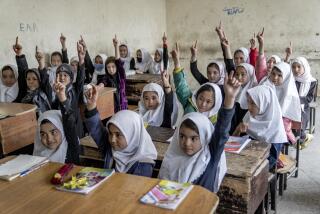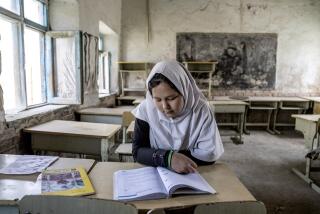Pakistan’s Poor Scrounge for Education
- Share via
DIPALPUR, Pakistan — More than 100 children huddle under a small bit of shade in a dusty field alongside a highway. Some leaf through tattered booklets. Most stare blankly into space or at the cars whizzing past.
Not an ideal setting for learning, but in rural Pakistan it is the best the government has to offer.
Next to the field stand empty “classrooms,” more akin to work sheds since none have windows and there is not a piece of furniture in sight.
Tens of millions of dollars that the government earmarked for schools never reached rural areas like this, and may have ended up in the pockets of Pakistan’s wealthy few or vanished into an endless trail of paper scams.
The government’s own surveys identified more than 7,000 “ghost” schools in two of the country’s four provinces. Money was budgeted for those schools, but they do not exist.
Finding a practical way to educate the masses in this impoverished nation of 140 million people is one of the most daunting tasks facing the new military regime, which toppled an overtly corrupt democratically elected government Oct. 12.
Pakistan’s official literacy rate is 36%, but experts estimate fewer than 25 people in 100 know how to read more than their name.
The World Bank recently administered a science test to third grade Pakistani public school teachers and their students. Both groups scored about the same, said Fareeha Zafar, an education expert who runs a chain of aid-financed schools in the Punjab region bordering India.
“The generation of Pakistanis that we are producing will only bring the country down,” said Mohammad Ershad Ahmed, a fourth-grade teacher in Sundar, a town an hour’s drive from Lahore.
Ahmed teaches 40 children who must sit on a hard concrete floor. Their parents scrounged up money last year to install electricity in the school, because the government refused to provide it.
“It’s an intentional move to keep the poor poor, so that only the few who are rich have access to more and more resources,” said Ahmed.
The inadequate school system has given rise to a new breed of entrepreneurs who promise better education--for a price. Tens of thousands of private schools, charging up to hundreds of dollars a month, are flourishing across Pakistan.
But that’s small help for Pakistan’s poor.
“Those who have the money will send their kids to private schools, so they’re not bothered if the public schools rot and die,” said Mehnaz Akbar, an education expert with the private Asia Foundation.
Some Pakistanis believe the military takeover is a last chance for the school system.
Hassan Din, 62, who earns 1,500 rupees ($30) a month, said he had to pay for uniforms and books to send his eight children to a government school, but “still they learned nothing--they are all laborers like me.”
“The army at least are not robbers, so for that we are hopeful,” he said.
More to Read
Sign up for Essential California
The most important California stories and recommendations in your inbox every morning.
You may occasionally receive promotional content from the Los Angeles Times.













